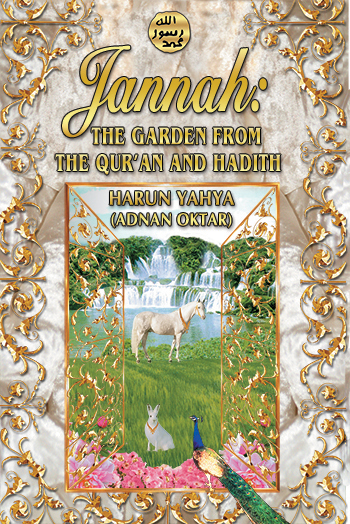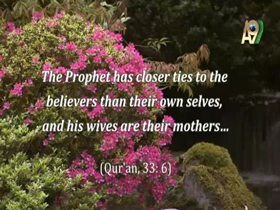Bigotry: The Dark Danger
Letters of invitation to Islam

The Byzantine emperor, Heraclius, the Persian king, Khosrau, the Copt king, Muqawqis, the king of Christian Arabs, Hashim B. Abi Shimr, the Ghassanid king, the king of Yamama, Hevze Ali, and King Najashi Ashama of Ethiopia... they all received messengers bearing Prophet Muhammad’s amazing letters, inviting them to Islam.
God gave the Prophet the task of spreading the message of the Quran not only to Arabs, but to the whole world. For that reason, in the seventh year of Hegira (Hijrah), the Prophet sent letters not only to kings and emperors, but also to Christian, Jewish and Zoroastrian communities, inviting them to Islam.
God informs us that our Prophet was sent for all humanity in the following verse: Say: “Mankind! I am the Messenger (prophet) of God to you all, of Him to whom the kingdom of the heavens and earth belongs. There is no god but Him. He gives life and causes to die. So have faith in God and His Messenger, the unlettered Prophet, who has faith in God and His words. Follow him so that hopefully you will be guided.”
After the Treaty of Hudaybiyyah, the Prophet began to prepare the “letters of invitation to Islam” with his blessed hands and wise words, and he decided to send them to the emperors, kings and ethnarchs of the age.
One day, he called one of his companions and said: “God has sent me to all humanity as a sign of His mercy. So help me spread Islam to the world.” The Prophet’s request was immediately carried out and the companions who knew the languages of the countries they visited were assigned to deliver these magnificent letters.
The Prophet sealed all his letters to emphasise their importance and demonstrate how special they were. He had a silver ring in which the words: “Muhammad, the Messenger of God” were engraved, and he sealed all of the letters with this ring. The Prophet carried this ring until he passed away, on his blessed, immaculately clean and radiant hand.
After his death, the ring passed to Hazrat Abu Bakr, Hazrat Umar and Hazrat Uthman, respectively.
In 610, five years after the Prophet began the divine task of communicating God’s message, he sent some of his companions to Ethiopia in two separate groups, with one year in between, because of the Meccan polytheists’ oppression, threats, trade embargos and attacks. The second group included Ja’far ibn Abi Talib, the Prophet’s nephew. Ja’far far carried the sealed letter the Prophet wrote to Najashi for an invitation to Islam. In his letter, he began by saying: “In the Name of God, the Most Beneficent, the Most Merciful”; “From Muhammad the Messenger of God to Ashama ibn Abjar-al-Najashi, king of Abyssinia (Ethiopia).
“I convey to you the Exaltedness of God besides Whom there is no other deity: the Sovereign, the Holy, the Peace-giver, the Guardian. And I bear witness that ‘Isa the son of Maryam, was a spirit from God and His Word that He blew into Maryam the virgin, the virtuous. He created Him by His Spirit and blew into him (life) just as He created Adam with His own hands. And I invite you to God the only God, Who has no partners, Whose Guardianship is obtained through His obedience. And that you should follow me and believe in that which has come to me, for I am God’s Messenger. I invite you and your forces to God, the Most High. I have thus delivered the message to you and have admonished you. So, accept my good advice. I am sending my nephew, Ja’far, from the side of my uncle, on a journey to you with a small group of Muslims. Peace be upon he who follows true guidance.”
Najashi was very impressed by this magnificent letter and the Prophet’s words, exalting God and praising the Prophet Jesus, and he let the Muslims who took shelter under him to live safely in his country. However, in the meantime, the anger of the polytheists extended beyond Mecca and they sent a messenger committee carrying gifts for Najashi, requesting that the Muslims be expelled from his country. Najashi paid no attention to this demand and summoned Ja’far to his palace. Ja’far explained to Najashi that they too were ignorant until God chose one of them as His messenger, and that from our Prophet they learned how to pray to God, perform prayers, fast, give alms, not to speak ill of women, protect the livelihood of orphans and not to misappropriate.
After that, at the request of Najashi, Ja’far read the Surah Maryam from the Quran, which is about the births of the Prophets, Jesus and Yahya. Najashi and the Christian clerics around him burst into tears from the emotion they felt listening to the verses from the Quran. Once Najashi heard that the verses corresponded with the explanations in the Gospel and the Torah, he sent the polytheists of Mecca back to their own country, taking their gifts with them.
Najashi, who received the Prophet’s invitation to Islam and who listened to Surah Maryam, accepted Islam, along with the clerics. Later, Najashi, who sent his son with a letter to the Prophet to inform him that he had embraced Islam, demonstrated his love and respect for the Prophet in the following words: “If only I were the servant of Muhammad in exchange for my sultanate! For that servitude is above all sultanates.” When Najashi died, his funeral prayer was performed in absentia by the Prophet in Madinah.
These letters, which were preserved to this day as a valuable piece of heritage from Prophet Muhammad, carry very important messages for us Muslims. In his letters, the Prophet addressed the People of the Book (Jews and Christians) and foreigners of his time with the same loving, friendly and protective tone, which reflects the good morals of Islam in the best possible way. In our time, where discrimination, xenophobia, racism and sectarianism are at their most extreme, the letters of the Prophet instil a universal lesson in all of us.
While some parts of the Muslim world ostracise the People of the Book, Muslims are facing hardships around the world because of Islamophobia, which is rapidly gaining ground in the Christian world. Muslims are in a difficult situation. We should right this wrong by following the commandment of God: “Only argue with People of the Book in the kindest way” (Surat Al-‘Ankabut, 46). If Muslims follow this commandment of God, the anti-Islamic sentiment, which has almost become paranoia in the Western world, will come to an end by the leave of God, as long as we follow the Quran and the wise counsel of Prophet Muhammad.
Adnan Oktar's piece in New Straits Times:
http://www.nst.com.my/news/2016/06/151761/letters-invitation-islam
2016-06-14 22:55:53



_12.jpg)
_08.jpg)


